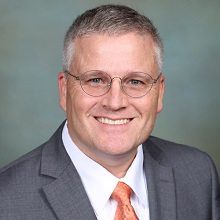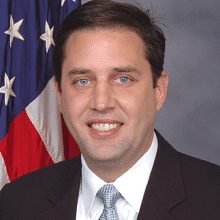
If you’re in the healthcare space, there’s a term you may be hearing more of soon: Total Exposure Health. A precursor to President Obama’s Precision Medicine Initiative, Total Exposure Health stands at the intersection of healthcare and technology, using a clinical smart system, and accompanying advances in science, medicine, technology and IT, to better collect, analyze and understand all exposures (workplace, environmental and lifestyle) that individuals face.
Kirk Phillips and Richard Hartman created Total Exposure Health to more effectively achieve the President’s Precision Medicine Initiative. This is done by incorporating the exposure, which influences individual health risks, to drive both protective and clinical interventions. Recently, both spoke with WashingtonExec about Total Exposure Health, and why it’s a buzzword whose time has come.
WashingtonExec: What makes Total Exposure Health a bold new healthcare initiative?
Kirk Phillips: Science today is taking us to a place where we no longer have to look at animal data applied to humans; we can now look at individuals’ exposure response using genomics and molecular biology. We’ve never been able to bring to a clinician this kind of information that will tell them exactly — for the full day or lifetime of a patient — what types of exposures they had and what types of expressions their bodies might be having to that exposure. This new reality allows for a true preventative health approach.
Richard Hartman: It’s a really exciting time in our history, with the advances in the science, technology and information space and especially in medicine. Total Exposure Health bridges all those innovations into one common solution – that is, how the Internet of Things creates healthier lives.
WashingtonExec: What makes the time right for Total Exposure Health?
Kirk Phillips: We, as a society, are now choosing to track where we are and what we are doing to a much greater extent. Individuals are using wearables because they want to track their own health.
At the same time that wearable and their phone is matching where they are, whether they are indoors or outdoors and where they are in their environment.
We have incredible computer systems that have large databases of data on exposure. In no other time have we had everything coming together where we have the ability to tag environmental exposures to an individual based on where they are, combined with individualized exposures based on a sampling that can be done in real time.
WashingtonExec: What takeaways does Total Exposure Health hold for others wanting to carve out their niche in the healthcare IT space?

Richard Hartman: For entrepreneurs and businesses, there are several opportunities. For example, genomics companies can start to work on identifying how chemicals affect our genes through exposomics. Currently, the CDC and the DoD are interested in the TEH data to improve epidemiology and global operations, and mission effectiveness. Payers as well as big pharma are interested in this information as well to determine which new medicines and prevention plans to develop so both individual and institutional health care costs can be reduced. There’s also sensor development, apps, etc., to monitor and control exposures, and academia to better understand the effects of exposures on the human genome.
Key will be integration into the electronic health record and developing the expert systems to take the billions of data sets to then present in a useful and actionable way to the healthcare provider. This will encourage participatory medicine and get away from the medical visit that is short and in some cases focused simply on data entry.
Kirk Phillips: Data also has to be brought into a usable format, so I see that as a great IT opportunity where a slick system can be created that grabs data from the EPA, from industries reporting, the National Ambient Air Quality Standards, from local traffic conditions, etc., all in a way where people’s apps and their mobile devices know where they were and brings in all of that health exposure piece.
WashingtonExec: How can Total Exposure Health impact healthcare on the physician level?
Richard Hartman: We’re finding a lot of physicians right now are not happy with the way they are providing healthcare, especially with electronic health records, because they feel like they are more administrators getting data input than they are physicians connecting with their patients. From a clinical perspective there can be a million data points and it really requires the proper smart systems to display the information to providers in a useful way that will encourage another type of healthcare that is out there called participatory medicine where both the provider and the patient are really engaged.
WashingtonExec: What concerns does the focus on Big Data raise with the successful implementation of Total Exposure Health?
Richard Hartman: Big Data requires both trailblazing individuals and institutional commitment. The private sector is leading the pack, for example, IBM is betting their company on it. What’s unique about TEH is how the Internet of Things promotes better lives, that is, TEH promotes the promise of Big Data, which is sensing (collecting exposures with sensors), seeing (using informatics to make sense of the data) and acting (using expert systems so clinicians can make better interventions).
Kirk Phillips: IT is essential to TEH and ideally IT can bring a one-stop shop where providers, patient, payers and big pharms have one set of Big Data. The biggest challenge is a common EHR. Along with that typical string of issues to include: Integration and interoperability, privacy; security and the use of structured and unstructured data, especially with the proliferation of sensors and devices and the explosive growth in structured and unstructured data, causing information and contextual overload.
WashingtonExec: Where can we expect TEH to move to over the next six months to a year?
Kirk Phillips: In the next six months I see Total Exposure Health getting funding support out of DoD and probably in a little over six months there will be some requests for proposals to address some of these issues, areas where we need work.
There will be a significant body of work in terms of gathering all known science and research known today that will be finally able to identify exactly where the gaps are. That will also drive the need for external work. I think there will also be a formalized documentation that really explains in government how we will be initiating precision medicine with TEH as the primary component for the exposure piece of an individual’s health, then with all of the other aspects completing the work.
Richard Hartman: Total Exposure Health will shape the future delivery of healthcare!


